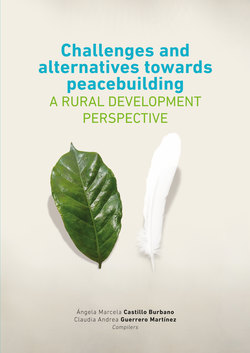Читать книгу Challenges and alternatives towards peacebuilding - Israel Biel Portero - Страница 7
На сайте Литреса книга снята с продажи.
ОглавлениеContextualization of the collective work
The research “Rural development alternatives for peacebuilding: educational strategies to strengthen the ability of producers and young people that contribute to the coffee production chain in the municipalities of Leiva, Policarpa and Los Andes of the department of Nariño, with international impact in the province of Carchi-Ecuador” arose from a call addressed to municipalities with Development Plans with a Territorial Focus (Spanish acronym PDET); sub-regional programs of comprehensive transformation of the rural area, for a period of 10 years in the territories most affected by armed conflict, poverty, illicit economies and institutional weakness. PDETs are a planning and management instrument to prioritize the implementation of the components of the “Reforma Rural Integral” or “Comprehensive Rural Reform” program and the relevant measures established by the Final Agreement for 170 prioritized municipalities with a total of 6.6 million inhabitants; 2.5 million of whom are victims of armed conflict and represent 36% of the national territory (Educando paz. Café de paz, 2018, pp. 14-16).
In this post-conflict scenario, to effectively respond to the requirements identified in the prioritized areas, the Ministry of National Education in May 2017, launched the “Call for the formation of a bank of eligible higher education projects that promote rural development by forming inter-institutional alliances”. This call was intended to invite higher education institutions to base their inventory of educational actions and projects around rural development and peacebuilding through the formation of inter-institutional alliances. In the case of the department of Nariño, the PDET of Alto Patía and Norte del Cauca and the PDET of Pacifico and Frontera Nariñense were prioritized.
The initiative by the institutions should be to develop one or several lines of work proposed by the Ministry of National Education: flexible adaptable educational models, educational access and student retention, and alliances for rural development. In the department of Nariño, the Rural Development Alliance was formed between the Universidad Cooperativa de Colombia (UCC) – Campus Pasto, the Corporación Universitaria Minuto de Dios (UNIMINUTO), the Corporación Unificada Nacional de Educación Superior (CUN), the Universidad Politécnica Estatal del Carchi (UPEC) in Ecuador and the Federación Nacional de Cafeteros – Comité Nariño.
One of the actions proposed by the inter-institutional alliance was this interdisciplinary project that involves the research groups: Indesco, La Minga, Eslinga, GIISE, GIOD of the Universidad Cooperativa de Colombia and GICAEF of the Corporación Universitaria Minuto de Dios.
The authors of the book integrate academic experiences around the social, human, legal, economic and engineering sciences. The research shares a qualitative and quantitative approach to consolidate an exploratory scope, in topics that are rarely addressed in the territory of analysis (the Cordillera region of the department of Nariño), and descriptive scope by the analysis of the phenomena concerning rural development and peacebuilding.
